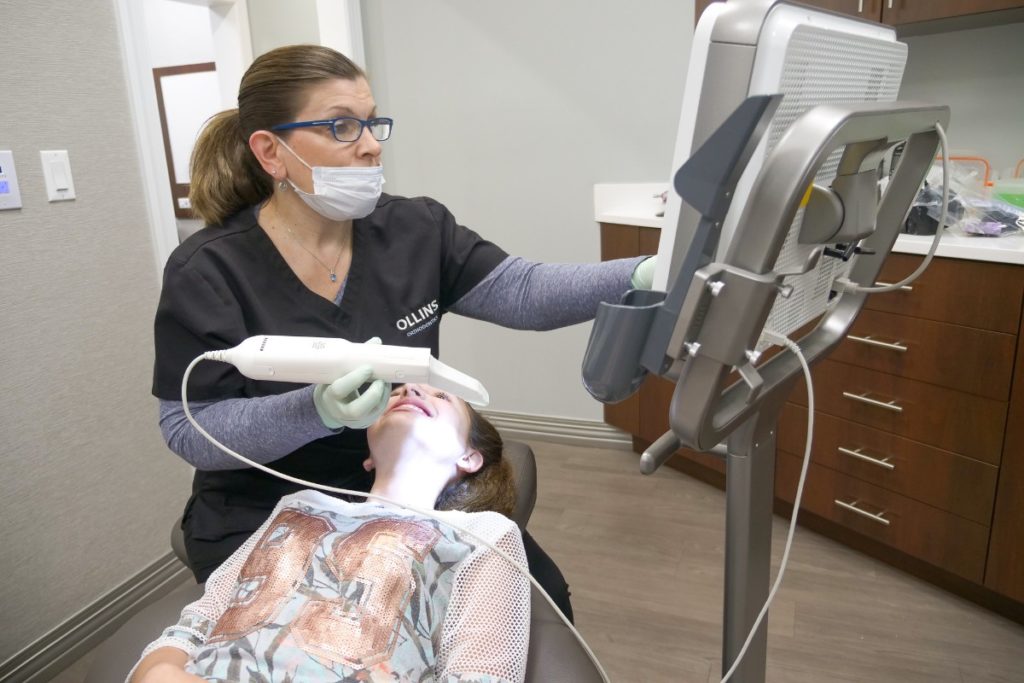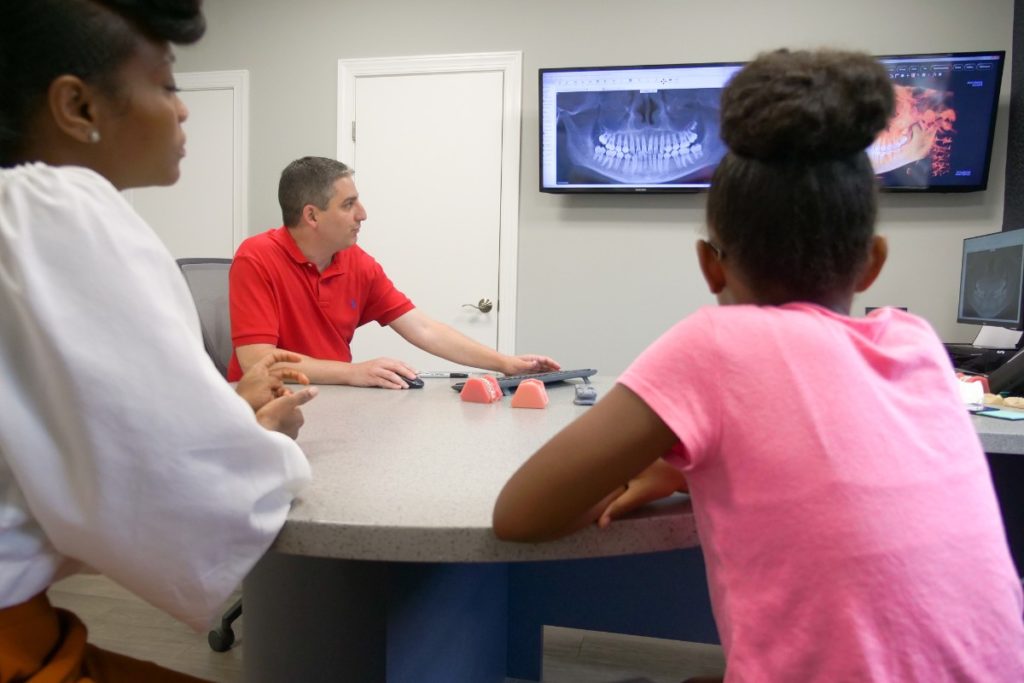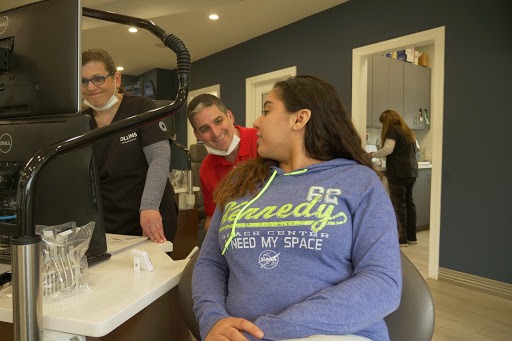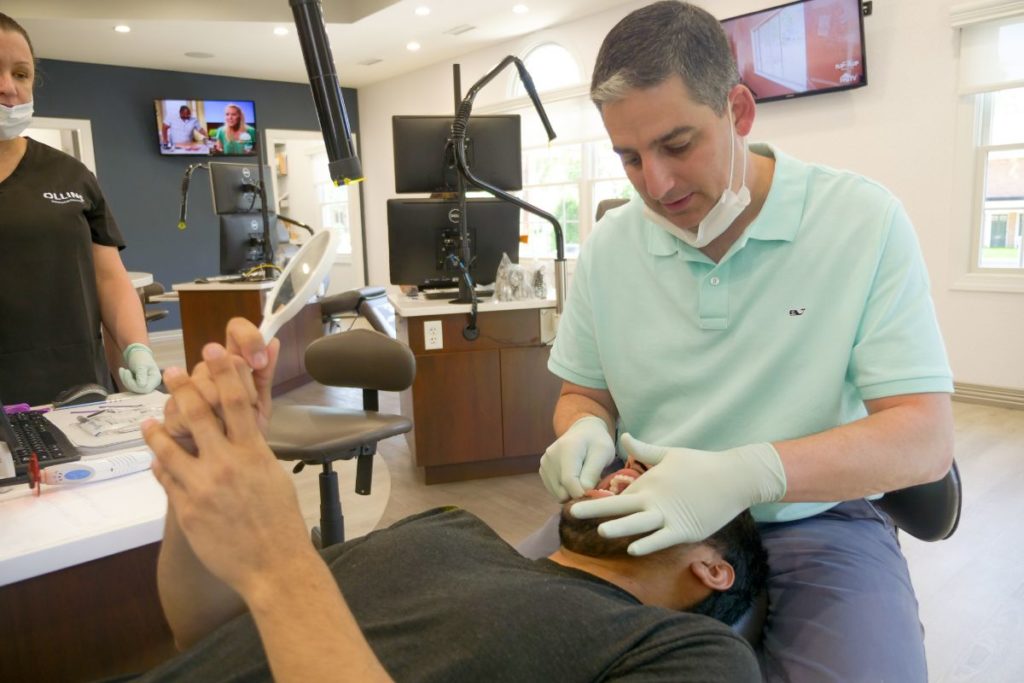We’ve all heard that an apple a day keeps the doctors away…but what about the dentist? Ongoing research indicates that what we choose to eat and drink can strengthen immunity and improve our ability to fight bacteria and inflammation, which helps protect the teeth and gums. Nutrition can even impact the way our bodies handle bacteria attacks that can cause cavities. The reverse is also true, of course. Our diets can affect both our overall health and our oral health, increasing the risk for tooth decay and other dental problems.
At Ollins Orthodontics, we’re all about straight smiles, but our care doesn’t stop there! We want to help you achieve a healthy, fully functional mouth that looks and feels great. Orthodontic treatment is one way to do this, but maintaining a nutritious diet is an important part of the process, as well. To better understand how nutrition and oral health are linked, it helps to know how good foods can protect your teeth, how a poor diet can negatively affect them, and how your diet can keep your teeth and gums healthy. Keep reading below to learn more!
Nutrition: one of the first building blocks for oral health
Nutrition affects us before we’re ever even born. The nutrients an expectant mother consumes, such as calcium, vitamin D, phosphorus, and protein, play a part in helping a baby’s teeth begin to form and mineralize properly. This relationship is one that will continue throughout our lives! In our teen years, the teeth continue to develop and mineralize, and our oral tissues actually never stop recycling. To make the most of this process, we should be consuming a variety of vitamins and minerals. One of the easiest ways to accomplish this is by eating a healthy diet and drinking lots of water!
Because we know that good nutrition is important in disease prevention, counseling patients on their diet has become increasingly common for dentists and orthodontists as a preventative measure. Nutritional deficiencies can reduce your resistance to dental disease and inhibit your body’s ability to fight certain types of infection. A healthy, nutritious diet is beneficial to your total body health, and can also decrease your risk of developing tooth decay and enamel erosion.
Human mouths are naturally hospitable to all different kinds of bacteria, and unfortunately, not all of them are helpful. Many of these more harmful microorganisms thrive on sugar in your diet, which is one of the biggest reasons we’re advised to avoid consuming too much-added sugar in our diet. As bad bacteria in your mouth process ingested sugar, they begin producing acids that can eat into the enamel of your teeth. When enamel is worn away, it can leave your teeth sensitive, cracked, and discolored. It can also set the stage for small holes forming in the teeth, otherwise known as cavities. If left untreated over time, tooth decay can continue to worsen. It may become painful, and eventually, the teeth can loosen or even fall out.

A healthy diet contributes to a healthy smile
Occasionally, concerns are voiced about the sugars in foods like whole grains, fruits, and vegetables. Fortunately, there’s no evidence that these kinds of naturally occurring sugars are harmful to the teeth, even when they come in starch-rich packages such as bread, rice, and potatoes. That’s great news for your smile, since these can all be excellent sources of healthy vitamins and mineral that help strengthen your teeth and protect enamel. Bonus: most of them are safe for braces!
Looking for some specific examples of healthier choices that can contribute to a stronger smile and improved oral health? We’ve got you covered.
Calcium-fortified juices, milk, and other dairy products like yogurt are rich in calcium and vitamin D. This helps promote healthy teeth and bones, reducing the risk of tooth decay or tooth loss occurring.
Speaking of dairy products, cheese packs a calcium punch that mixes with plaque and sticks to the teeth. This does a good job of protecting them from the acid that causes decay, and helps to rebuild tooth enamel, too.
Certain kinds of crisp fruits and raw vegetables can clean plaque from teeth and freshen breath. Apples, carrots, and celery are good examples of this. Leafy greens are also excellent for your oral health since they contain high amounts of magnesium, vitamin A, vitamin C, beta carotene, calcium and magnesium. These minerals are instrumental in improving and maintaining healthy teeth gums by protecting gums and other tissues from cell damage and bacterial infection.
There are a number of complex carbohydrates contained in certain whole grains that give bad bacteria less digestible food to grow on, while chicken, red meat, and fatty fish contain phosphorus, a vital component of strong teeth and tooth enamel.
Why water is important for oral health
Although we love soda, juice, and sports drinks in this country, they’re pretty notorious for leaving behind sugars that can feed bad bacteria. As the bacteria devours this sugar, it produces acid that can eat away at the enamel of your teeth. Sodas and juices can also have phosphoric, citric, or malic acids added to them. If you already have issue with your enamel eroding, these acids can exacerbate that, further weakening teeth.
Water, on the other hand, is one of the best things you can do for your mouth! It helps to wash away any leftover food and debris, which bad bacteria love, and it also dilutes the acids produced by these bacteria. Not only that, but drinking water more regularly can help relieve a dry mouth and bad breath, too. Although an increased water intake throughout the day should never be used as a substitute for your normal oral hygiene routine, it can definitely go a long way towards keeping your mouth clean and healthy, and reduces the risk of cavities at the same time.

Ollins Orthodontics is here to help you find your healthiest smile
A diet that promotes good oral health isn’t just about the foods you do or don’t eat — when and how you eat them is also important. Try to stick to recommended serving sizes, and keeps snacks to a minimum. Foods that are eaten as part of a meal actually cause less harm to the teeth than eating many snacks throughout the day, because more saliva tends to be released during a meal. That extra saliva washes foods from your mouth, and also neutralizes any harmful acids being produced.
Here at Ollins Orthodontics, we’re able to provide you with the treatment and support necessary for a straighter smile, but you what you choose to eat and drink can make a big difference in your oral health, too! If you’re in Nutley and would like to learn more about how good nutrition can improve your oral health, give us a call! We’d love to discuss how you can improve oral hygiene at home for a healthier, stronger smile that lasts a lifetime.

